You can transform your home into a calming oasis by growing these seven anxiety-busting aromatherapy plants. Lavender, nature's calming queen, soothes with its gentle scent. Chamomile offers serenity through its sweet aroma and relaxing tea. Jasmine's uplifting fragrance enhances mood and sleep quality. Lemon balm's citrusy scent relieves stress and has multiple uses. Rosemary boosts mental clarity and cognitive function. Peppermint invigorates and refreshes while reducing anxiety. Valerian acts as a powerful sleep and relaxation aid. These easy-to-grow plants not only beautify your space but also provide natural remedies for stress and anxiety. Discover how each plant can uniquely contribute to your well-being.
Key Takeaways
- Lavender, chamomile, and jasmine are easy-to-grow plants with calming scents that reduce anxiety and improve sleep quality.
- Lemon balm's citrus aroma uplifts mood and calms nerves, while rosemary enhances mental clarity and cognitive function.
- Peppermint offers an invigorating scent that combines refreshment and tranquility, helping to reduce anxiety and boost mood.
- Valerian, known for its powerful sleep-inducing properties, can be grown at home and its roots used for teas and tinctures.
- These aromatherapy plants can be used fresh, dried, or as essential oils in diffusers, teas, bath soaks, and homemade skincare products.
Lavender: Nature's Calming Queen
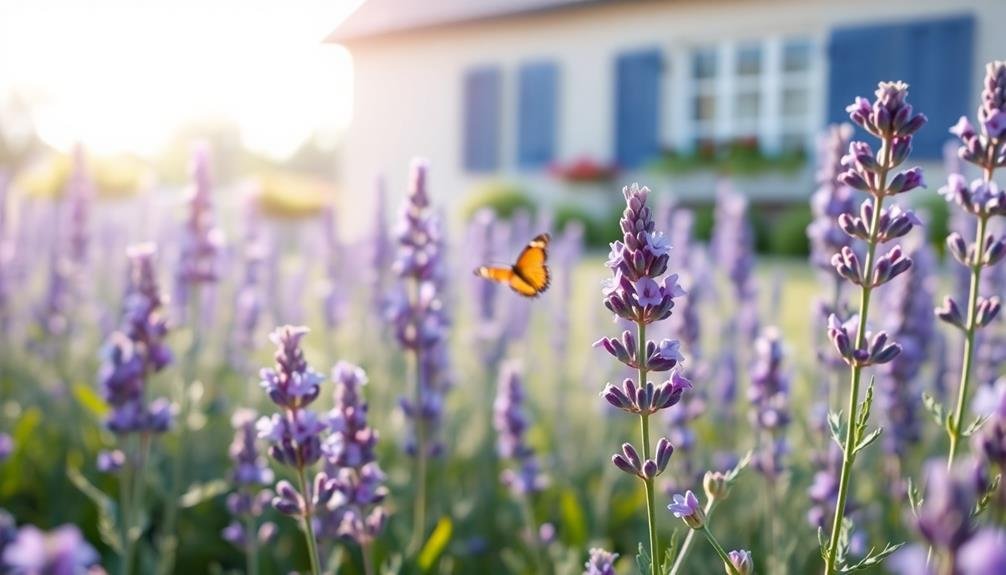
Lavender, often hailed as nature's calming queen, is a must-have for any home aromatherapy garden. This versatile herb boasts a soothing scent that can help reduce anxiety, improve sleep quality, and promote relaxation. You'll find it easy to grow lavender in well-draining soil and full sun.
To harness lavender's benefits, you can use fresh or dried flowers. Try making your own lavender sachets to place under your pillow or in drawers. You can also create a calming room spray by steeping lavender buds in water and adding a few drops of lavender essential oil.
For a quick stress-relief technique, rub a few lavender leaves between your fingers and inhale deeply. The plant's oils will release their calming aroma instantly.
If you're feeling crafty, try infusing lavender into homemade candles or soap for a long-lasting aromatic experience.
Remember to prune your lavender plants regularly to encourage bushier growth and more abundant flowering. With proper care, you'll have a constant supply of this anxiety-busting herb right at your fingertips, ready to transform your home into a tranquil oasis.
Chamomile for Soothing Serenity
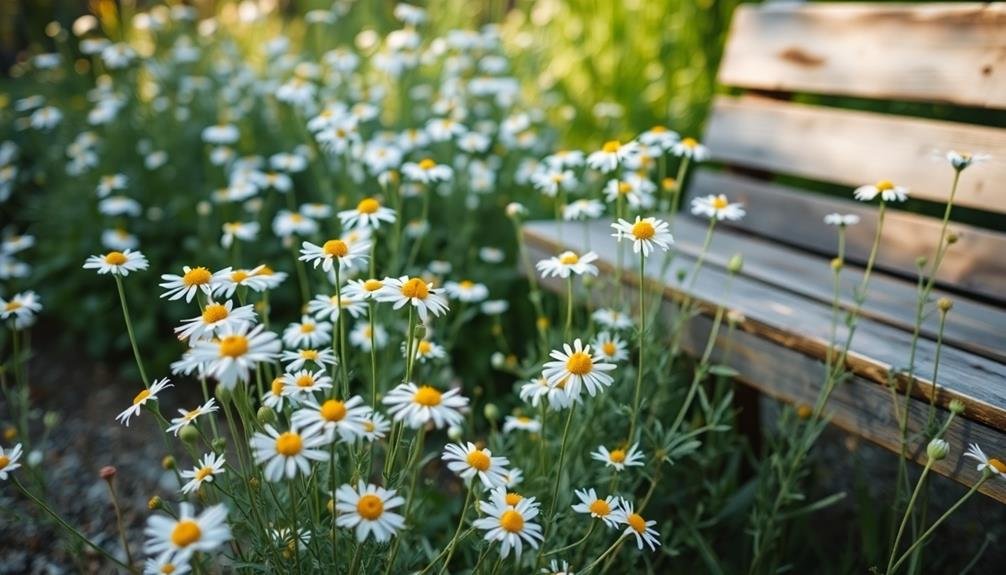
If you're looking to cultivate tranquility in your home garden, chamomile is an excellent choice.
You'll find growing this gentle herb straightforward, and you can easily harvest its flowers to create soothing teas.
Beyond its calming properties when consumed, chamomile's sweet, apple-like scent can be used in aromatherapy to promote relaxation and ease stress.
Growing Chamomile at Home
Chamomile, with its delicate daisy-like flowers, is a must-have for any aromatherapy garden. You'll find two main varieties: German chamomile (Matricaria recutita) and Roman chamomile (Chamaemelum nobile). Both are easy to grow and offer similar benefits, but German chamomile is typically preferred for tea.
To grow chamomile, choose a sunny spot with well-draining soil. Sow seeds directly in the garden after the last frost, or start them indoors 6-8 weeks before. Lightly press the seeds into the soil without covering them, as they need light to germinate. Keep the soil moist until seedlings appear.
Once established, chamomile is drought-tolerant and doesn't require much care. Water only when the soil feels dry, and avoid over-fertilizing.
Harvest the flowers when they're fully open, preferably in the morning after the dew has dried. To dry them, spread the flowers on a screen in a warm, dark place with good air circulation.
You can use fresh or dried chamomile flowers for tea, add them to bath sachets, or extract their essential oil for aromatherapy purposes. With proper care, your chamomile plants will provide a steady supply of soothing blooms throughout the growing season.
Chamomile Tea Preparation Tips
After harvesting your homegrown chamomile, you're ready to brew a comforting cup of tea. To prepare the perfect infusion, start by drying your chamomile flowers. Spread them on a clean, flat surface in a well-ventilated area for about a week. Once dried, store the flowers in an airtight container away from light and moisture.
When brewing your tea, use 1-2 teaspoons of dried flowers per cup of water. Here's a quick guide to steeping times and water temperatures:
| Water Temperature | Steeping Time | Flavor Profile |
|---|---|---|
| 200°F (93°C) | 3-5 minutes | Strong, robust |
| 185°F (85°C) | 5-7 minutes | Balanced, mild |
| 170°F (77°C) | 7-10 minutes | Delicate, light |
For the best flavor, use freshly boiled water and cover your cup while steeping to prevent the volatile oils from escaping. If you prefer a stronger brew, increase the amount of flowers rather than the steeping time to avoid bitterness. You can also add a slice of lemon or a teaspoon of honey to enhance the flavor. Remember, chamomile tea is caffeine-free, making it an excellent choice for evening relaxation.
Aromatherapy Benefits of Chamomile
Beyond its use in teas, chamomile offers a wealth of aromatherapy benefits that can transform your home into a haven of tranquility. The sweet, apple-like scent of chamomile essential oil can help reduce anxiety, promote relaxation, and improve sleep quality.
You'll find that inhaling chamomile's aroma can quickly soothe frazzled nerves and calm a racing mind. To harness chamomile's aromatherapy benefits, you can use a diffuser to disperse the essential oil throughout your living space.
Alternatively, add a few drops to your bathwater for a relaxing soak, or mix it with a carrier oil for a calming massage. You'll also find chamomile in many natural sleep aids and relaxation blends.
Chamomile's anti-inflammatory properties make it useful for skin care as well. When applied topically, it can help soothe irritated skin and reduce puffiness.
You might even consider making your own chamomile-infused lotions or facial mists for a rejuvenating and calming effect.
Jasmine's Uplifting Aroma
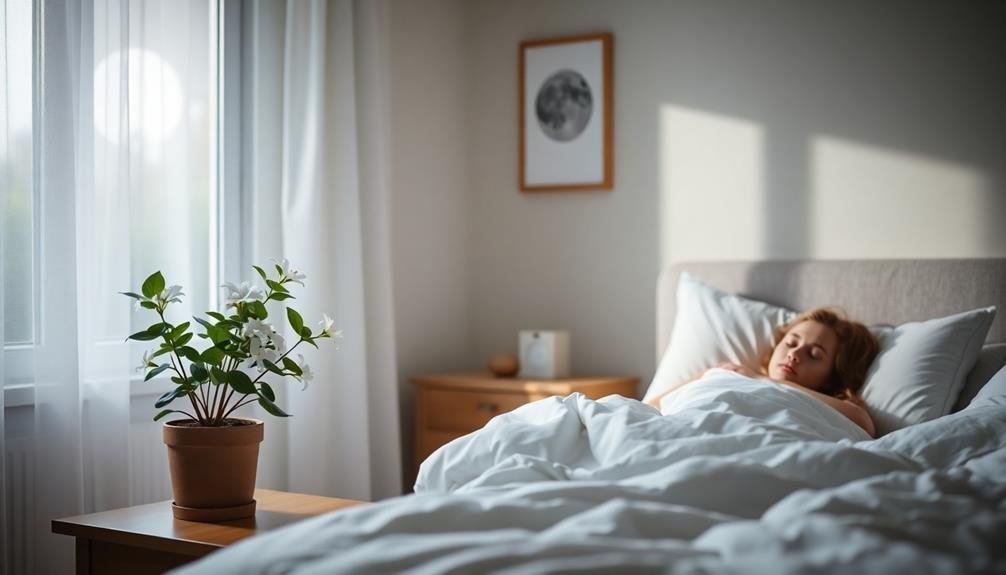
The enchantment of jasmine's aroma has captivated people for centuries. This delicate white flower's scent is known for its uplifting and mood-enhancing properties, making it an excellent choice for your home aromatherapy garden.
Jasmine's sweet, floral fragrance can help reduce anxiety and promote relaxation. You'll find that its aroma can boost your mood, increase alertness, and even improve sleep quality.
To grow jasmine at home, choose a sunny spot with well-draining soil. Most jasmine varieties prefer warm climates, but some can tolerate cooler temperatures.
When caring for your jasmine plant, water it regularly and provide support for its climbing vines. Pinch back the tips of young plants to encourage bushier growth. As the flowers bloom, you'll be rewarded with their intoxicating scent.
To use jasmine in aromatherapy, you can place fresh flowers in a bowl or create your own essential oil by steeping the blossoms in a carrier oil. You can also add dried jasmine flowers to potpourri or sachets for a long-lasting fragrance in your home.
Lemon Balm's Stress-Relieving Powers
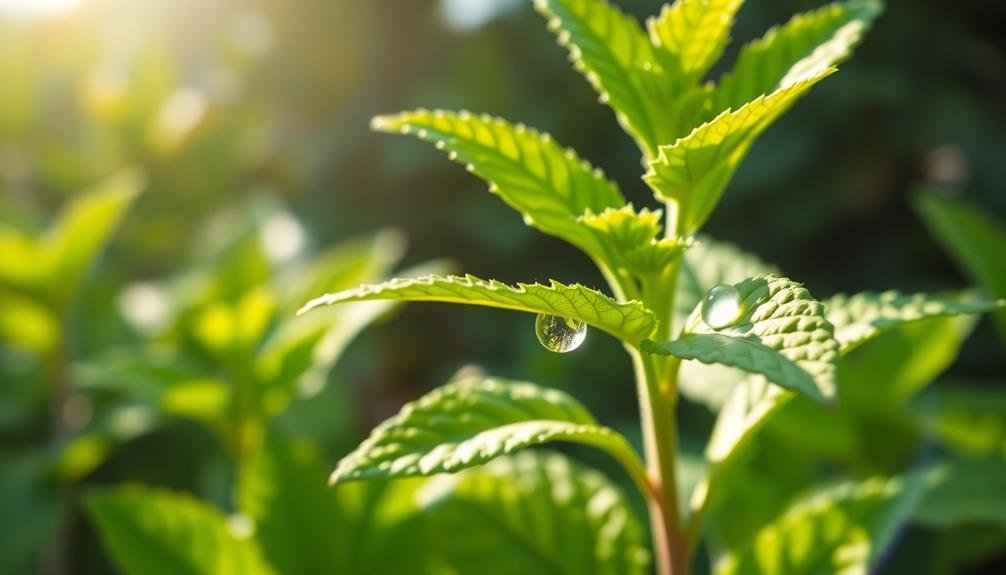
While jasmine offers a sweet floral scent, lemon balm brings a revitalizing citrusy aroma to your aromatherapy garden. This versatile herb is renowned for its stress-relieving properties and can be easily grown at home. You'll find that lemon balm's fresh, lemony fragrance can instantly uplift your mood and calm your nerves.
To harness lemon balm's stress-busting powers, you can use it in various forms. Here's a quick guide to help you incorporate this anxiety-reducing plant into your daily routine:
| Method | Preparation | Benefits |
|---|---|---|
| Tea | Steep fresh leaves | Relaxation, improved sleep |
| Essential oil | Diffuse or apply topically | Reduced anxiety, mental clarity |
| Tincture | Blend with alcohol | Digestive aid, mood enhancement |
| Bath soak | Add leaves to bathwater | Muscle relaxation, stress relief |
| Culinary use | Add to salads or desserts | Flavor enhancement, mild calming effect |
Growing lemon balm is straightforward. Plant it in well-drained soil with partial shade to full sun. It's a fast-growing perennial that thrives in most climates. Regular pruning will keep it bushy and prevent it from spreading too aggressively. With proper care, you'll have a constant supply of this aromatic, stress-relieving herb at your fingertips.
Rosemary for Mental Clarity
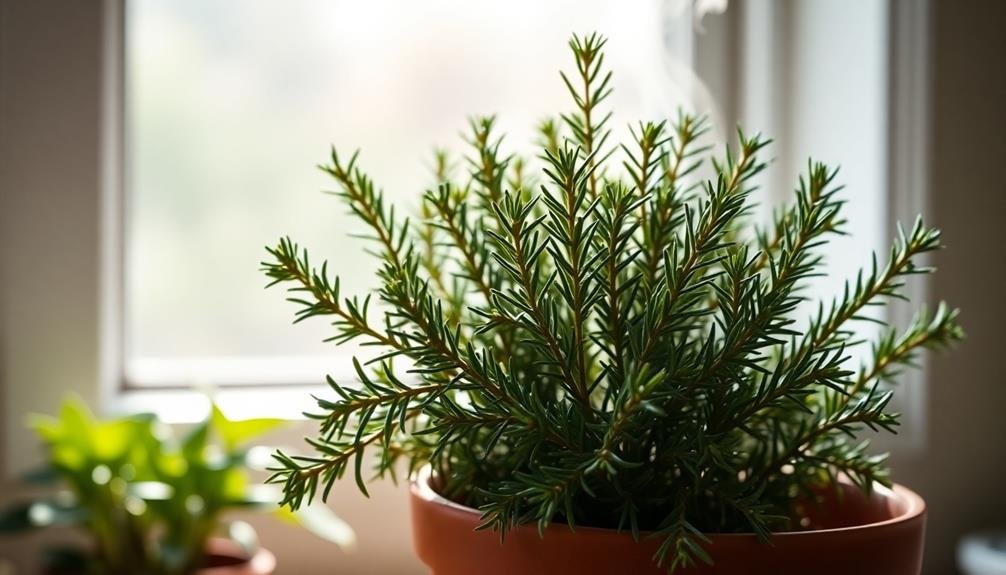
Aromatic rosemary isn't just for cooking; it's also a powerful herb for enhancing mental clarity and focus. This Mediterranean shrub contains compounds that can improve cognitive function and memory. When you inhale rosemary's scent, it stimulates your brain, increasing alertness and concentration.
Growing rosemary at home is relatively easy. It thrives in well-draining soil and prefers full sun. You can plant it in your garden or keep it in a pot on a sunny windowsill.
To use rosemary for aromatherapy, simply crush a few leaves between your fingers and inhale deeply. You can also add sprigs to a warm bath or use rosemary essential oil in a diffuser.
Regular use of rosemary aromatherapy may help reduce mental fatigue, improve mood, and boost overall cognitive performance. It's particularly beneficial when you're studying, working on complex tasks, or need to stay alert during long drives.
Additionally, rosemary has antioxidant properties that may protect your brain from oxidative stress and inflammation. By incorporating this versatile herb into your daily routine, you'll enjoy its culinary benefits while also supporting your mental well-being.
Peppermint's Refreshing Calm
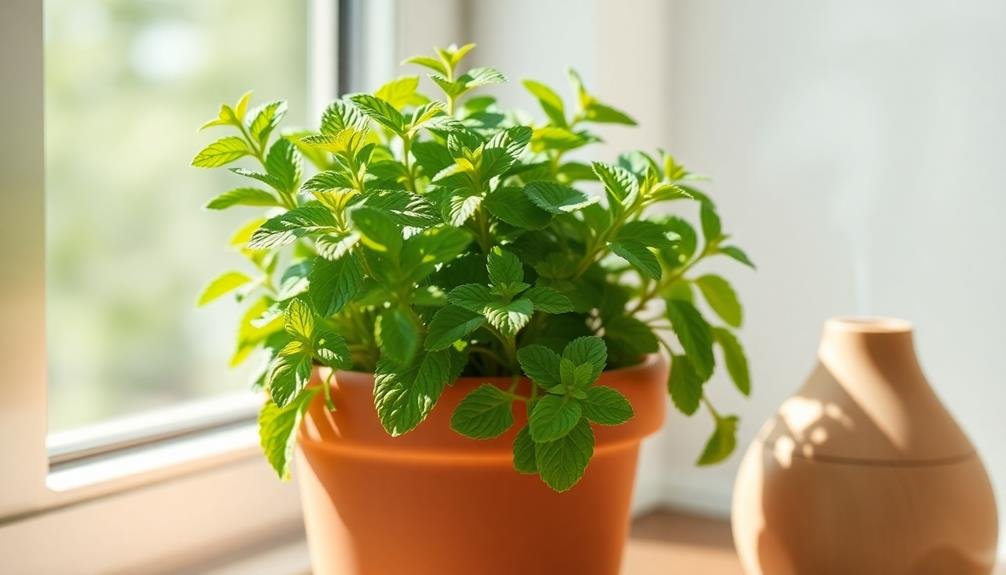
Renowned for its invigorating scent, peppermint offers a unique blend of refreshment and tranquility. This versatile herb can help reduce anxiety, improve focus, and boost your mood. You'll find it easy to grow peppermint at home, whether in a garden bed or a small pot on your windowsill.
To harness peppermint's calming effects, simply crush a few leaves between your fingers and inhale deeply. The menthol in peppermint stimulates your senses, promoting mental clarity while simultaneously soothing your nerves. You can also brew fresh peppermint leaves into a tea for a relaxing drink that aids digestion and eases tension headaches.
Growing peppermint requires minimal effort. It thrives in partial shade and moist soil, spreading quickly through underground runners. To prevent it from taking over your garden, consider planting it in a container.
Harvest leaves regularly to encourage bushier growth and maximize your yield. You can dry the leaves for later use or use them fresh in aromatherapy applications. Keep in mind that peppermint's potent aroma can repel pests, making it a valuable addition to your garden ecosystem.
Valerian: Sleep and Relaxation Aid
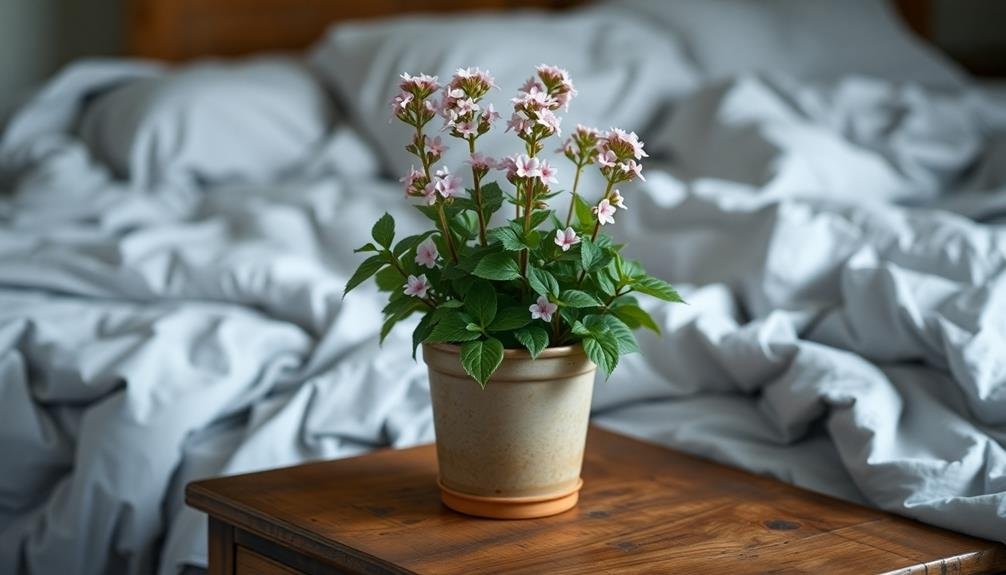
Valerian root stands out as a powerful natural sleep aid and relaxation promoter. You'll find this perennial herb easy to grow in your garden, thriving in partial shade and moist soil.
While it's the root that's most commonly used for its calming properties, the plant's small pink or white flowers add a delicate touch to your outdoor space.
To harness valerian's benefits, harvest the roots in the fall after the plant has been growing for at least two years. Wash them thoroughly, chop them into small pieces, and dry them for future use. You can then brew the dried roots into a tea or use them to make tinctures and extracts.
- Tall stems reach up to 5 feet, adorned with feathery leaves
- Clusters of tiny, sweet-scented flowers bloom in early summer
- Cats are often attracted to valerian, similar to their reaction to catnip
When using valerian for sleep or anxiety relief, start with a small dose and gradually increase as needed.
While it's generally considered safe, consult your healthcare provider before using it regularly, especially if you're pregnant, nursing, or taking other medications.
Frequently Asked Questions
Can Aromatherapy Plants Interact With Medications for Anxiety or Depression?
Yes, aromatherapy plants can interact with anxiety or depression medications. You should always consult your doctor before using them alongside prescribed treatments. Some plants may enhance or interfere with your medication's effects, so it's essential to be cautious.
How Long Does It Take for Aromatherapy Plants to Grow Indoors?
You'll find that indoor aromatherapy plants grow at different rates. Some, like lavender, can take 3-6 months to mature. Others, such as basil, grow faster, reaching maturity in 4-6 weeks. It depends on the specific plant.
Are There Any Aromatherapy Plants That Are Safe for Pets?
You'll be glad to know there are pet-safe aromatherapy plants. Try growing lavender, chamomile, or calendula. They're gentle on your furry friends while providing calming scents. Always research specific plants and monitor your pets' reactions when introducing new ones.
What's the Best Method for Extracting Essential Oils From Homegrown Plants?
To extract essential oils at home, you'll need a distillation setup. Start by steam distilling your plants, collecting the condensed vapor. It's a complex process, so you might want to contemplate purchasing a small home distillation kit for best results.
Can Aromatherapy Plants Help With Other Conditions Besides Anxiety?
You'll find aromatherapy plants can help with more than just anxiety. They're effective for stress relief, improving sleep, boosting mood, and easing headaches. Some plants even have antibacterial properties, potentially aiding in physical healing too.
In Summary
You've now discovered seven powerful aromatherapy plants to help ease your anxiety. By growing these at home, you'll have a natural remedy at your fingertips whenever stress strikes. Remember, each plant offers unique benefits, from lavender's calming effects to rosemary's mental clarity boost. Experiment with different scents to find what works best for you. With a little care and attention, you'll create your own personal oasis of tranquility right in your home garden.

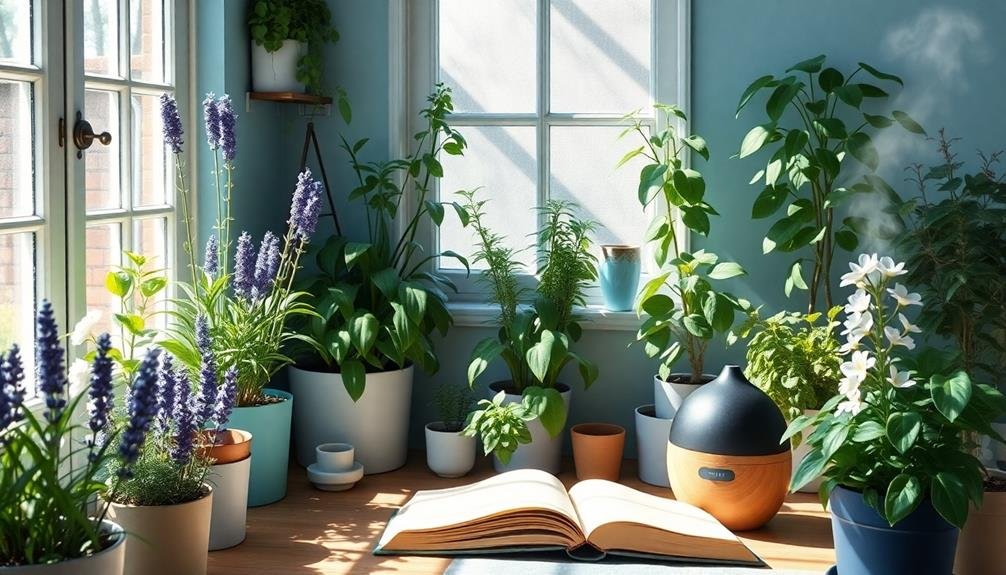
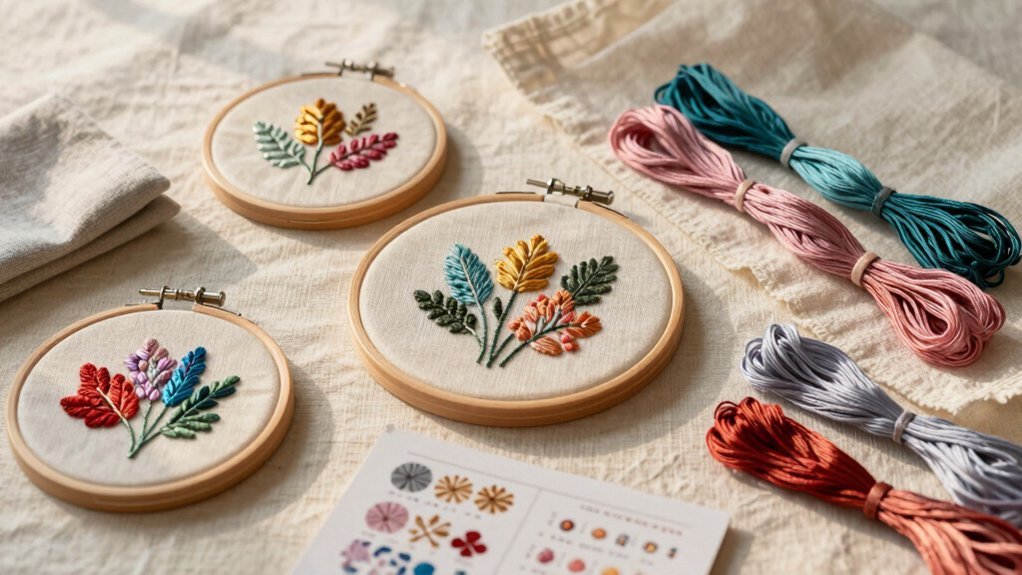


Leave a Reply